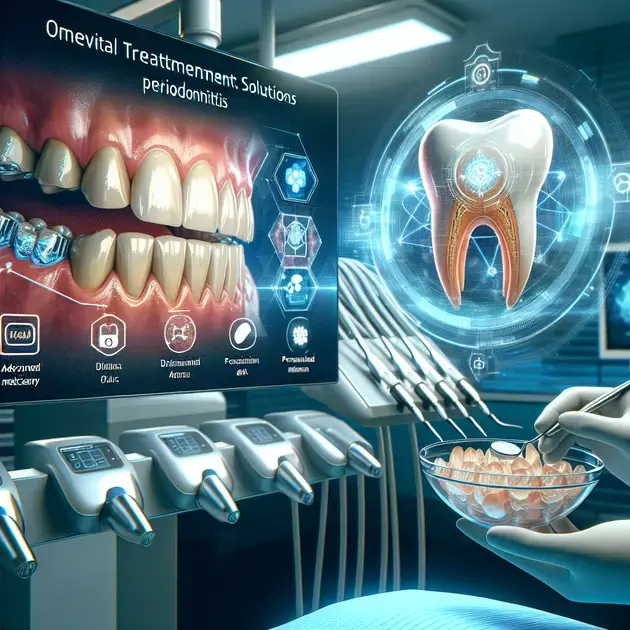When it comes to combating periodontitis, finding the most effective medication is crucial for successful treatment. In this comprehensive guide, we will explore the various options available to help manage and treat this common dental condition.
With advancements in dental research and technology, there are now more choices than ever when it comes to medications for periodontitis. From traditional antibiotics to innovative topical treatments, patients have a range of options to choose from based on their specific needs and preferences.

Effective Medication Options for Periodontitis
Periodontitis is a serious gum infection that can lead to tooth loss if left untreated. Fortunately, there are effective medication options available to help manage and treat this condition. When choosing the right medication for your needs, it’s important to consult with your dentist or healthcare provider to determine the best course of treatment. Here are some common medication options for periodontitis:
1. Antibiotics:
Antibiotics are often prescribed to help control bacterial infections in the gums. Common antibiotics used for periodontitis include doxycycline, tetracycline, and metronidazole. These medications help reduce inflammation and fight infection.
2. Antiseptic Mouthwash:
Antiseptic mouthwashes containing chlorhexidine or cetylpyridinium chloride can help reduce plaque and bacteria in the mouth. Using a mouthwash as part of your daily oral hygiene routine can aid in preventing and treating periodontitis.
3. Anti-inflammatory Medications:
Nonsteroidal anti-inflammatory drugs (NSAIDs) such as ibuprofen can help reduce pain and inflammation associated with periodontitis. These medications can be used in conjunction with other treatments to provide relief from symptoms.
4. Prescription-strength Toothpaste:
Your dentist may recommend a prescription-strength toothpaste containing special ingredients to help control plaque and bacteria buildup. Using this toothpaste as directed can improve the health of your gums and prevent further progression of periodontitis.
5. Periodontal Gels or Chips:
In some cases, your dentist may recommend placing a periodontal gel or chip containing antimicrobial agents directly into the gum pockets. These localized treatments can help target infection and promote healing in specific areas of the mouth.
By working closely with your dental provider and following their recommendations, you can effectively manage periodontitis and maintain good oral health.
Choosing the Right Medication for Your Needs
When it comes to selecting the right medication for your periodontitis treatment, personalized care is key. Your dentist will assess the severity of your condition, overall health, and any existing allergies or sensitivities before recommending a specific medication. Here’s a step-by-step guide to help you choose the right medication:
1. Consultation with a Dental Professional:
Schedule an appointment with your dentist to discuss your symptoms and concerns. Your dentist will perform a thorough evaluation of your oral health and recommend appropriate treatment options, including medication.
2. Review of Medical History:
Provide your dentist with a comprehensive medical history, including any medications you are currently taking and any known allergies or sensitivities. This information will help determine the safest and most effective medication for your needs.
3. Discussion of Treatment Goals:
Clearly communicate your treatment goals and expectations with your dentist. Whether you are seeking pain relief, infection control, or long-term management of periodontitis, your dentist can tailor a medication regimen to address your specific needs.
4. Consideration of Side Effects:
Be sure to discuss potential side effects of the prescribed medication with your dentist. Some medications may cause mild side effects such as gastrointestinal upset or allergic reactions. Understanding these risks can help you make an informed decision.
5. Follow-up and Monitoring:
After starting medication treatment, schedule regular follow-up appointments with your dentist to monitor your progress. Your dentist may adjust your medication dosage or regimen based on your response to treatment and overall oral health status.
By following these steps and maintaining open communication with your dentist, you can choose the right medication to effectively manage your periodontitis and improve your oral health.
Exploring Innovative Treatment Solutions
In addition to traditional medication options, there are innovative treatment solutions available for periodontitis that can enhance the effectiveness of your care. These advanced treatments utilize cutting-edge technologies and techniques to address gum disease in new and exciting ways. Here are some innovative treatment solutions to explore:
1. Laser Therapy:
Laser therapy is a minimally invasive treatment option that uses focused laser energy to target and eliminate bacteria in the gum pockets. This technology can help reduce inflammation, promote tissue regeneration, and improve overall gum health.
2. Platelet-Rich Plasma (PRP) Therapy:
PRP therapy involves using concentrated platelets from your own blood to promote healing and tissue regeneration in the gums. This natural approach can accelerate the body’s healing processes and enhance the outcomes of periodontal treatment.
3. Regenerative Procedures:
Regenerative procedures such as bone grafting and tissue engineering can help repair and rebuild damaged gum and bone tissues caused by periodontitis. These advanced techniques can restore the structure and function of the gums for improved oral health.
4. Microbial Testing and Targeted Antibiotic Therapy:
Microbial testing allows dentists to identify specific bacteria causing the infection and tailor antibiotic therapy to target these pathogens effectively. This precision medicine approach can optimize treatment outcomes and reduce the risk of antibiotic resistance.
5. Oral Probiotics:
Oral probiotics containing beneficial bacteria strains can help restore the natural balance of oral microbiota and support gum health. Incorporating oral probiotics into your daily oral hygiene routine can strengthen the immune system and prevent periodontal disease progression.
By exploring these innovative treatment solutions in conjunction with traditional medication options, you can take a proactive approach to managing periodontitis and achieving optimal oral health outcomes.

Choosing the Right Medication for Your Needs
When it comes to selecting the appropriate medication for your specific health needs, it is essential to consider various factors. Consulting with a healthcare professional is the first step in determining the most suitable treatment option for you. Whether you are dealing with a chronic condition or a short-term illness, the right medication can make a significant difference in your overall well-being. Understanding your symptoms, medical history, and any potential side effects is crucial in making an informed decision.
Researching different medications and their effectiveness in treating your particular condition is also essential. Reading reviews and seeking recommendations from healthcare providers can help you narrow down your options. Additionally, considering the cost and availability of the medication is important, as adherence to the treatment plan is vital for successful outcomes.
Another key factor to consider when choosing medication is the mode of administration. Some individuals may prefer oral medications, while others may find topical treatments more convenient. Understanding your preferences and lifestyle can help you select a medication that aligns with your needs and ensures better compliance with the prescribed regimen.
It is important to note that not all medications are suitable for everyone. Allergic reactions, interactions with other medications, and underlying health conditions must be taken into account when making a decision. Your healthcare provider can guide you in assessing the risks and benefits of each medication to ensure a safe and effective treatment plan.
In conclusion, selecting the right medication for your needs requires careful consideration of various factors, including your symptoms, medical history, preferences, and potential risks. By working closely with your healthcare provider and staying informed about the available options, you can make an informed choice that supports your overall health and well-being.
Exploring Innovative Treatment Solutions
As advancements in medical research continue to expand, innovative treatment solutions are becoming more accessible for individuals seeking alternative options. When traditional medications may not provide the desired results or present challenges, exploring innovative treatments can open new possibilities for managing health conditions.
One innovative approach to treatment is personalized medicine, which involves tailoring therapies to individual characteristics such as genetic makeup and lifestyle factors. By analyzing specific biomarkers and genetic data, healthcare providers can recommend targeted treatments that may offer greater efficacy and reduce the risk of adverse effects.
Another emerging trend in healthcare is the use of telemedicine and digital health solutions to deliver care remotely. Virtual consultations, mobile apps for tracking symptoms, and remote monitoring devices allow patients to access healthcare services conveniently and stay connected with their healthcare providers.
Additionally, regenerative medicine, such as stem cell therapy, is gaining recognition for its potential in treating a variety of medical conditions. By harnessing the body’s natural healing abilities, regenerative treatments offer a promising option for individuals seeking alternative therapies for chronic diseases or injuries.
By exploring these innovative treatment solutions and discussing them with your healthcare provider, you can discover new possibilities for managing your health and well-being. Embracing advancements in healthcare technology and personalized medicine can lead to improved outcomes and a more tailored approach to addressing your unique health needs.
Maximizing the Benefits of Periodontitis Medication
When it comes to managing periodontitis, maximizing the benefits of medication is crucial for effectively controlling the progression of the disease and maintaining oral health. Periodontitis medication, such as antimicrobial mouth rinses or antibiotics, plays a significant role in reducing bacterial infections and inflammation in the gums.
One key strategy for optimizing the benefits of periodontitis medication is to follow the prescribed treatment plan diligently. Consistent use of the medication as directed by your dentist or periodontist is essential for achieving the desired outcomes and preventing recurrence of the infection.
In addition to medication, incorporating good oral hygiene practices, such as regular brushing, flossing, and dental cleanings, can enhance the effectiveness of the treatment and promote overall gum health. Maintaining a healthy lifestyle, including a balanced diet and avoiding tobacco use, can also contribute to better outcomes in managing periodontitis.
Monitoring your progress and attending follow-up appointments with your dental provider are important steps in ensuring that the medication is working effectively and making any necessary adjustments to the treatment plan. Open communication with your healthcare team about any concerns or side effects is key to maximizing the benefits of periodontitis medication.
By taking a proactive approach to managing periodontitis and working closely with your dental provider, you can optimize the benefits of medication and improve the health of your gums. Consistent adherence to the treatment plan, combined with good oral hygiene practices and healthy lifestyle habits, can support long-term oral health and prevent complications associated with periodontal disease.
Conclusion
Choosing the right medication for your health needs is a critical decision that requires thorough consideration. By consulting with healthcare professionals and understanding your symptoms, medical history, and preferences, you can make informed choices that support your overall well-being. Researching different medications, considering their effectiveness, cost, and mode of administration can help you narrow down options and enhance adherence to the treatment plan.
Exploring innovative treatment solutions in healthcare can provide new opportunities for managing health conditions. Personalized medicine, telemedicine, and regenerative treatments offer tailored approaches that may improve outcomes and reduce adverse effects. By staying informed and discussing these options with your healthcare provider, you can discover novel ways to address your unique health needs and embrace advancements in healthcare technology.
Maximizing the benefits of periodontitis medication requires a comprehensive approach that includes following the prescribed treatment plan diligently, maintaining good oral hygiene practices, and leading a healthy lifestyle. By working closely with your dental provider, monitoring your progress, and communicating openly about any concerns, you can optimize the effectiveness of the medication and promote long-term oral health. Consistent adherence to the treatment plan and a holistic approach to gum care support in preventing complications associated with periodontal disease.



